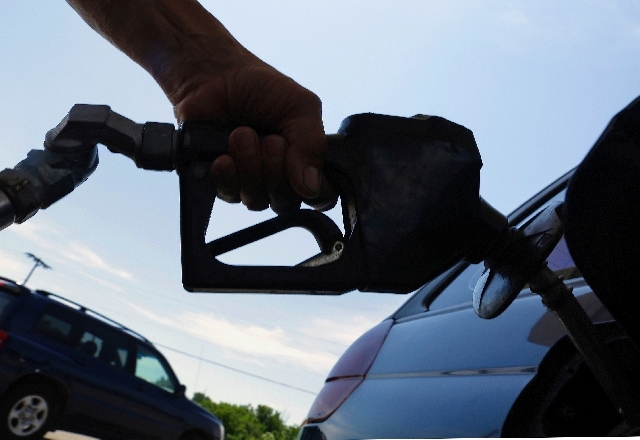Commissioner questions whether county fuel tax will create local jobs

Clark County’s potential fuel tax increase would create nearly 10,000 jobs, transportation officials say, giving an economic boost to the hard-hit construction industry.
But it remains unknown how many construction jobs would end up going to local workers and companies. One county commissioner still has unanswered questions about how much the county fuel tax dollars would help the Nevada workforce versus out-of-state construction companies.
“My concern is if we go ahead with this, I want to do whatever we can to maintain Nevada jobs, and I’m not getting that reassurance,” commission Chairman Steve Sisolak said.
The fuel tax increase, if approved by county commissioners in September, would raise the tax on all vehicle fuels by about 3 cents a gallon for each of the next three years.
The Regional Transportation Commission estimates that the increase would allow it to bond out for $700 million to $800 million, paying for about 183 transportation projects throughout the county.
Under the commission’s analysis, the tax increase would result in between 8,931 and 9,467 jobs. Of those, between 4,738 and 5,526 would be direct construction jobs. The rest would go to other sources that indirectly benefit from the economic uptick, such as construction material suppliers that do business with contractors.
Some of the road improvement projects — most notably those involving the planned Interstate 11 close to the Arizona border — will require federal dollars in addition the local funding. The project, still years in the future, would connect Las Vegas and Phoenix with an interstate, with a bypass through Boulder City.
Other major projects expected to get a boost from the proposed fuel tax increase are Project Neon, which would overhaul Interstate 15 through the center of Las Vegas, and improving Maryland Parkway between the McCarran International Airport and downtown. Officials are still finalizing the list of projects.
When federal dollars are involved, federal regulations kick in. Under federal bidding rules, the job goes to the lowest bidder, regardless of where the company is based, state and local transportation officials said.
Sisolak said he would want the fuel tax revenue to go toward helping the local economy with Nevada jobs. But the I-11 project, for example, is closer to Arizona contractors than Las Vegas companies, he said.
Transportation officials maintain that regional companies will remain competitive, given their lower costs.
“We anticipate that most of this work will go to local contractors and local labor pools and local suppliers,” said Mike Hand, director of engineering services for streets and highways for the Transportation Commission.
Hand noted that out-of-state companies have added costs, such as covering employee travel expenses.
“Their cost of labor is higher to start with, so they’re not going to be as competitive on the bidding front,” he said. “We’ve always found, by and large, it’s local contractors doing the work. We see a lot of the same labor pool and a lot of the same bidding.”
It’s uncertain, at this point, how many of the road improvement projects tied to the fuel tax would fall under the federal requirement. The project list isn’t finalized yet, and some of them still could gain federal dollars before starting.
Scott Magruder, a spokesman for the Nevada Department of Transportation, said it’s rare for the state agency to hire an out-of-state company as the low bidder. At least 90 percent of its jobs have gone to in-state contractors, he said.
An out-of-state company getting the job is just part of the equation, though.
Sometimes, an outside company might get the low bid but end up hiring local workers to keep costs down, Magruder said.
The rules change for projects without ties to the federal government’s purse strings.
For public works projects relying only on state and local dollars, government agencies can give a 5 percent preference to in-state contractors, under Nevada’s bidders preference law. That means agencies can still hire a Nevada contractor at a higher cost over an out-of-state low bidder, provided the Silver State company’s bid isn’t more than 5 percent higher than the out-of-state contractor’s cost.
To qualify for that preference, at least half of a contractor’s employees must have Nevada driver’s licenses or state identification cards.
Tina Quigley, manager of the Transportation Commission, stressed the long-term benefits of road construction projects.
“It will restore needed jobs to this industry that has been hardest hit by the economic recession,” she said in an email, adding that the projects will decrease congestion, enhance public safety and improve access to the area.
The commission’s upcoming fuel tax vote is possible because the Legislature this year passed enabling legislation to give the county that option.
The current county fuel tax is 9 cents. Each gallon already has 52.2 cents of taxes and fees, including federal, state and county taxes.
After the first three years of fuel tax increases, residents get to weigh in on whether to allow more fuel tax increases in November 2016. In a vote, residents will decide then whether they want to authorize commissioners to put additional fuel tax increases in place each year, which would be tied to the rate of inflation. If they reject future increases, the first three years of fuel tax increases will remain in place.
Contact reporter Ben Botkin at bbotkin@reviewjournal.com or 702-405-9781. Follow him on Twitter @BenBotkin1.